#s4: Utopia Project
Explore tagged Tumblr posts
Text
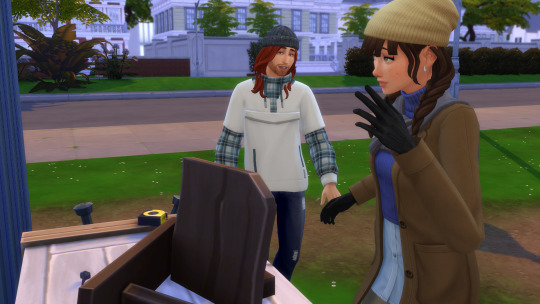
Glenn is happy to share his knowledge
8 notes
·
View notes
Note
How would various S4 members play The Sims :D
Fushimi kills everybody. He makes Sims just to watch them die,possibly occasionally naming them after certain subordinates and thenwhen he’s irritated he gets to like set them on fire or watch themslowly starve to death and it feels oddly satisfying. Doumyouji Simhas died in like ten different ways so far, Fushimi will hack thegame and create more ways to kill Sims if he has to. However he alsodoes have a couple Sims that he takes care of, he has one little YataSim that he denies having created and makes sure is always happy andwell taken care of. (Also once he made an entire city of Sims andthen killed them all in a fire, he had to shut the computer down andstop playing because it made him feel vaguely ill for reasons hedoesn’t want to dwell on.)
Awashima probably makes grand romances with her Sims, she creates abunch of different ones and lets them romance each other. She enjoysmaking her own little soap opera out of them, like it’s her secretguilty pleasure to play out her own romance novel out of Sims.Munakata meanwhile runs his Sims like a true community, like heintends to create a utopian Sim society as a test for the desiredworld he intends to create in the real world. He has Sims in theimage of all his subordinates, he’s got an Awashima and each memberof the alphabet squad and of course a cute Fushimi-kun who is hisfavorite Sim to dote on.
The rest of the squad play in various ways, like Akiyama and Benzaibuy the pet expansion pack and create Sims in their own image wholive happily with a bunch of cats. Enomoto makes Sims of his favoriteidols and anime characters and plays with those, he’s also made an‘Enomoto’ Sim who is super cool and stylish and all the other Simsare attracted to him. Hidaka’s Sims are all female and have thelargest boobs the game let him make (except for his Fushimi Sim, ofcourse, who Hidaka just made on a whim and wants to see be happy).Doumyouji’s Sims constantly die because he keeps forgetting aboutthem and it reminds everyone why he’s not allowed to have a pet.Gotou’s Sims live happily in their cursed apartment surrounded bycursed trinkets and sometimes whenever anyone else walks past hiscomputer after he’s done playing they get a weird chill.
#k project#Talking K#you know Fushimi kills all his Sims#he gets annoyed and just watches them die to calm down#it's soothing#Munakata has the great Sim utopia#even if it isn't possible he manages it through sheer will#Awashima secretly has the S4 soap opera happening with her Sims#Fuse makes a Fushimi Sim and then a Sim of himself to be more popular and better than the Fushimi Sim
33 notes
·
View notes
Text
okay question: how many CASTOR clones are there? we know there are 274+ LEDA clones from the finale and ob:tnc, but I don't think there would be NEARLY as many CASTOR clones, partly because we only see six throughout the whole show (not counting the dead baby bones), partly because of practicality (how the fuck would virginia coady have personally mothered three hundred kids), and partly because the LEDA clones' magnitude seems to be for optimum data collection, rather than a sustainable military operation. the closest approximation we get is something paul said offhand: something like "when I left, we were trying to cure six soldiers." that tells us that before he went to be the CASTOR mole in dyad, there were only six clone soldiers left, and seven total CASTORs. (I don't think he would have been counting ira, since ira was never a soldier.) we see five of those six CASTORs: mark, rudy, seth, parsons, and styles miller (the last dude is mostly just there). oh, man, that's not even counting how many must have died before this point. so one of the six paul referenced must have died while he was beth's monitor. they'd have to seen the illness enough times to know what was happening, and it would need to have been happening long enough for them to develop the shock tests and cognition check-ups too. then there's military constraints. how much would they have paid for this prototype program? how much does one clone soldier cost? what number of children could virgina coady feasibly raise on her own in a military base?
all of these things considered, I'd say at most there were only 20-25 CASTOR clones, though I could honestly expand that to around 15-40; I don't think it'd be more or less than that. I don't know what the military is like, and no clue how many live on a base or work in a squad or whatever; this is just an estimate based on what I see in the show. I think it's interesting the difference between the two projects, the different scopes they were able to reach with the resources they had. while the military is massive and endowed, I imagine there's much more money and resources in the route that LEDA took, corporations and scientists and products. this in mind, I imagine neolution had pretty much written off project CASTOR or abandoned it to the military; 20 clones is miniscule compared to 300. I'm still not entirely clear on what susan duncan and neolution meant by "beautiful baseline," either. I think the most likely possibility, considering also s4's entire plot, is that they were trying to make the "perfect human" and sell it to prospective parents, eventually reaching that eugenicist utopia where everyone is exactly the same. but that's extremely off-topic. at the end of the day, the point of this post is that the CASTOR program was much much smaller than the LEDA program.
#I'm still a huge fan of the CASTOR plotline & I wish they had played that out more than they did#specifically with regards to mark & sarah because they had such a fascinating dynamic that we only saw a couple times#I think it would have been so cool if mark and ira and maybe a couple other clones eventually joined clone club#and a sibling relationship between the LEDAs and CASTORs was explored#anyway that's just me#meta#mine
4 notes
·
View notes
Text
My fic, organised by ep
Because yesterday I wanted to read all my TIP/TSP fic, and I couldn’t remember all of them.
The series rewrites that say (short) are all under 10K, but dedicate a large percentage of the space to an overview/quick adaptation of the series in question.
Also, yes I am procrastinating.
S1:
Series rewrite
Projected Longing (short)
Just One Word (short)
Rose
Bound Forever (soulmates au)
The Doctor Dances
Starry Night (post-ep)
Boom Town
Safer With You (post-ep)
Parting of the Ways
Eternity in her Eyes
S2:
Series rewrite
To Make Much of Time (Bad Wolf!Rose)
Snapshots of Forever (short)
Fifty Ways to Say I Love You (short)
Christmas Invasion
Hugging and Leaning (Nine x Rose, Ten x Rose)
Just Love Me (Nine x Rose, Ten x Rose)
Sealed With a Kiss (Starts with POTW, soulmates au Nine x Rose, Ten x Rose)
Sealed With a Kiss: Post Script
New Earth
Healing Hands (Nine x Rose, Ten x Rose, also ROTC/AOS)
A New Beginning
Tooth and Claw
By the Light of the Moon
The Stone Rose (Because yes it is)
His Fortuna
The Unspeakable Pleasure of an Unforgettable Kiss (follow up)
School Reunion
Old Friends, New Promises
Girl in the Fireplace
Better With Two? (post-ep talk)
Just the Bits In Between (major rewrite/fixit)
Rise of the Cybermen/Age of Steel
On the Same Page (post-ep)
A Slight Deviation from the Plan (post-ep)
Idiot’s Lantern
Gold Can Stay (Post-ep)
On the Cusp
At Last
With a Kiss, Undone
The Impossible Planet/The Satan Pit
Believing and Knowing
Casting Out Fear (Also AOG Forever scene)
Quiet Confessions
In My Arms Again
Anywhere You Are
Love and Monsters
House Rules (post-ep)
Fear Her
They Never, Ever Will
Army of Ghosts, Forever scene
On the Edge of Forever
Army of Ghosts/Doomsday (34 stories)
See here for my complete list
S3:
Series rewrite
Time is Still A-Flying
The Shakespeare Code
On the North Wind
Daleks in Manhattan/Evolution of the Daleks
A Strangely Familiar Touch (Eight x Rose, Ten x Rose, reunion fic)
Human Nature/Family of Blood
Always Her Doctor (Reunion)
Utopia
In the Shadow of a Ghost
Voyage of the Damned
The Most Wonderful Time of the Year
Taking Time (Follows previous story and deals with the aftermath of S3 and VOTD)
S4:
Series rewrite
Forever and Never Apart
Voyage of the Damned
The Stowaway
Partners in Crime
But Being Spent (also Silence in the Library and Midnight)
Finally Home
Turn Left
Two Words
Stolen Earth
Forever Bad Wolf
Long Time No See
Specials:
End of Time
The Light at the End of Time
New, New, New Doctor
S7:
Hide
Once Again With You (Eleven x Rose, post ep reunion)
47 notes
·
View notes
Text
High Wycombe is the Sussex Downs
The “triple poisoner” Sherlock mentioned he caught in High Wycombe at the end of TLD is from Doyle’s The Sign of the Four:
I assure you that the most winning woman I ever knew was hanged for poisoning three little children for their insurance-money - ACD
I once caught a triple poisoner in High Wycombe - Sherlock in TLD
What’s cool is that when Holmes says that line in the canon, he is slyly comparing none other than Mary Morstan to the triple poisoner. It’s kind of an iconic scene, where they have both just met Mary for the first time, as a client.
“What a very attractive woman!” I exclaimed, turning to my companion. He had lit his pipe again and was leaning back with drooping eyelids.
“Is she?” he said languidly, “I did not observe.”
“You really are an automaton- a calculating machine,” I cried. “There is something positively inhuman in you at times.”
He smiled gently.
“It is of the first importance,” he cried, “not to allow your judgment to be biased by personal qualities. A client is to me a mere unit, a factor in a problem. The emotional qualities are antagonistic to clear reasoning. I assure you that the most winning woman I ever knew was hanged for poisoning three little children for their insurance-money, and the most repellent man of my acquaintance is a philanthropist who has spent nearly a quarter of a million upon the London poor.”
“In this case, however-”
“I never make exceptions. An exception disproves the rule.”
An exception disproves the rule. Oh, Sherlock, you salty thing. Holmes is warning Watson about his attraction to Mary, and that you can’t judge a person’s inner quality by how appealing their facade is. In fact he’s saying you never should, because it’s always wrong. He gives an example: the most appealing woman he ever met was a murderer of children. While the most outwardly repellent man he knows is truly a hero. Watson begins to suggest that Miss Morstan is surely an exception, and her inner quality is as lovely as her facade. But Holmes cuts him off before he can make his point, and says that there are no exceptions. The very fact that Watson was drawn to Miss Morstan at their first meeting, by Holmes’s reasoning, means she’s bad news.
Then there’s also the fact that the example that occurs to Holmes makes the woman “not what she seems”, then an initially “repellent” man his example of someone who is beautiful underneath. Gosh I wonder if he’s talking about himself, and simultaneously suggesting that he is the better of the two romantic options who were together in the room with John just a few moments before.
More under the cut.
Holmes says facades are false, without exception. The more appealing the facade, the more likely it’s a trick. Mary’s image was improved for S4; her cute soft curls instead of the more harsh slicked back short hair from S3, the tan, her wardrobe had even improved from the bizarre things they dressed her in in S3. I believe Mary’s S4 ‘look’ was to exaggerate, and draw our attention to, the falseness of a facade. Mary’s facade as something empty/false was already pointed out quite dramatically in HLV when her image was projected onto the empty house. I think that was to warn us of what was to come. That like Holmes warned Watson in The Sign of the Four, WE would now need to guard ourselves from being fooled by a facade.
She’s a triple poisoner with a winning facade, and apparently she’s been caught:
I once caught a triple poisoner in High Wycombe - TLD
And here Sherlock was the one to catch the triple poisoner, whereas in the canon nothing like that was mentioned (even though you could argue that it was implied), therefore we can assume that this has significance for our story because that detail was added for TLD. I’ll come back to this at the end.
What’s also interesting is the rich philanthropist who seems repellent. Sounds like Culverton Smith.
Culverton Smith, who is clearly made to be physically ugly and “repellent”; the teeth, the bad suits, the general creepiness. An example of someone (or something) that we find near impossible to see past the repellency to the good underneath. Culverton did say that he was “in credit” for the things he’s done, lives saved, money donated, etc.
Sherlock says of Smith in TLD that he’s “the most dangerous, the most despicable human being I have ever encountered” compared to “the most repellent man of my acquaintance” about the philanthropist in The Sign of the Four.
Then there’s a neat little thing in TAB that completes the story; a near identical comment made by Holmes to one in The Sign of Four:
My dear Watson, you are allowing emotion to cloud your judgement - TAB
The emotional qualities are antagonistic to clear reasoning. - The Sign of the Four
If you recall the context of that comment in TAB, it was John berating Sherlock about his cocaine use, calling him a “drug addict”. So when Sherlock tells John that his emotions are clouding his judgement, it’s clearly because here is Sherlock behaving “repellently”, but wishing that John could see past that to who he is underneath. To reinforce that this is indeed a reference to that theme from the canon, little Billy then rushes in with the telegram that alerts them that Mary has gone off on some assassiny mission. John is then unwilling to admit that Mary is anything other than his ordinary wife. He still can’t see past a facade, a winning one, or a repellent one.
WATSON: What is it? What’s wrong? HOLMES: It’s Mary. WATSON: Mary? What about her? HOLMES: It’s entirely possible she’s in danger. WATSON: Danger? HOLMES: There’s not a moment to lose. WATSON: Is this the cocaine talking? What danger could Mary be in? I’m sure she’s just visiting with friends. (x)
If facades are always wrong, then Mary is the murderer, and Culverton Smith isn’t. Because well, he wasn’t, and didn’t kill Sherlock in the end. One layer of the many different ideas that Culverton Smith seems to represent, could be the idea of someone or something physically unappealing that puts us off, but which is “in credit” in terms of goodness once you look further.
My thoughts always go back to homophobia and what the commentary there could be; like something that initially repulses or repels people (queerness), but which is beautiful once people break down and dispel their own ugly ideas. Think of Madame Vastra in Doctor Who, Moffat’s custom made Sherlock mirror. Her lizardiness represents that perceived ugliness, yet she’s somehow extraordinarily beautiful too - her appearance represents both how queerness is perceived by homophobes, and also the beauty that it truly holds. Holmes clearly sees himself as having a repellent facade to John, but I’m not sure how much this reflects John’s actual thoughts, since that was Sherlock’s dream. And the subtext here is not referring to attraction so much as how facades are a bi-product of repression, and that they’re broken down the more knowledge we gain, aka information is power.
I think John is also that “repellent” alternative for Sherlock, just as Sherlock represents John’s initially repellent alternative to Mary. Sherlock and John both battle the internalised enemy that is repression. Our repression is why we find something repellent that isn’t repellent, because repression is brainwashing.
Repression stops us from seeing past a facade. So this theme could also be behind the Culverton-John mirroring that many have pointed out. Sherlock lying there in that hospital, dying, letting his “repellent” male-attraction in the shape of Culverton, be the death of him. Or, letting it (the John who bursts through the door) save him instead.
What is High Wycombe?
It’s a real place. A fairly normal/ordinary large town in England, and could be supposed to be a juxtaposition of ordinariness to make a joke about the idea of Sherlock taking Irene Adler there for dinner; an unlikely scenario. (High Wycombe does, however, boast a well-known BDSM sex dungeon/B&B. Very funny, Steven.)
Amy’s Choice is a Doctor Who episode in one of Moffat’s seasons that you’re possibly sick of hearing about. Anyway, it’s significant here again for different, non-EMP reasons. In that plot, of Amy’s two choices that the episode was named for (it was sort of subtext, but she needed to choose between two cute boys, Rory or the Doctor), Rory represented an “ordinary” existence as an alternative to the excitement and danger of life with the Doctor. There were two parallel realities (both later revealed to be hallucinations, but anyway). One of them was Amy and Rory’s ordinary but blissful domestic dream life in a quaint country home, in a town called Upper Leadworth. Upper Leadworth is an entirely fictional location invented for that Doctor Who episode. Here is what I’m proposing, then I’ll tell you why. I think this all does link back to the EMP-parallel in that episode, but for now this little connection stands on it’s own:
Upper Leadworth = High Wycombe
Upper = High. Yes?? Yes.
But also...
The village of Upper Leadworth and the charming country home represented a sort of promised land, a utopia for Rory and Amy (even though Rory wanted it more than Amy did). Remember that over and over and over, in both Doctor Who and Sherlock, Moffat uses a marketable het-romance as a mirror for Sherlock and John’s story, or certain aspects of it anyway. Including often Amy and Rory.
Upper Leadworth:

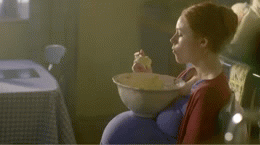
I think High Wycombe is the equivalent for Sherlock and John, to Rory and Amy’s Upper Leadworth.
.... AND I think High Wycombe is a temporary place-holder for Sussex and bee hives.
I think High Wycombe is a little code, and an assurance that this future for Sherlock and John exists (as does the night of passion). Even the idea of it being High or Upper suggests the idea of rising upwards, rising above limitations, coming up from “the underground”. Also, the “down” in Sussex Downs is the opposite of Up or High.
Rewriting Down as Up, and replacing Sussex Downs with High Wycombe (if only temporarily), is sort of like rewriting history - taking Sherlock’s lonely retirement in the Victorian era where he couldn’t openly be a couple with John, and replacing it with one where they will live together.
Also, there’s the fact that High Wycombe exists, whereas Upper Leadworth, for no clear reason, was chosen to be a fictional location. I would suggest that this is because Amy and Rory never really did exist there together in Upper Leadworth. They ended up being (sort of) defeated by the Weeping Angels who I argued briefly over here, mirror Mary as a villain. That’s why Upper Leadworth is a fictional village - it wasn’t Amy and Rory’s future.
High Wycombe is a real place however, because so is Sussex Downs, and Sherlock and John are going to actually go there.
I don’t think I need to convince y’all that the “romantic entanglement” in TLD conversation was not about Irene at all, but about Sherlock and John’s relationship with each other. Just as ASiB was exactly that; not about Irene, but about Sherlock and John. Irene represented that wedge of heteronormativity that came between them; she causes as much confusion between Sherlock and John as she does for the audience. And still, the writers use her as a coded way for Sherlock and John to talk about their feelings for each other, like they’ve done before:
So she’s alive then. And how are we feeling about that? - ASiB.
WATSON: Irene Adler. HOLMES: A formidable opponent; a remarkable adventure. WATSON: A very nice photograph. HOLMES: Why are you talking like this? WATSON: Why are you so determined to be alone? -TAB x
So let’s look at the High Wycombe mentions at the end of TLD and try to decode the scary mess that it is, because we’re pretty sure they’re not really talking about Irene.
D’you go to a discreet Harvester sometimes? Is there a ... night of passion in High Wycombe?
Night of passion. Hmmm. Then a minute later...
...High Wycombe is better than you are currently equipped to understand.
So now John is using High Wycombe as code for sex + a relationship. We’ve stopped talking about Irene. Sherlock the machine is not yet relationship material, not until his head and his heart can hug and make up then start working together.
...currently equipped to understand...
Remember when TLD aired and all our hopes and dreams were still alive we were in fairly good spirits because this WHOLE DAMN scene clearly seemed like a set-up for romance in episode 3?? I think it is, and was, still exactly that - a set-up for romance.
The dialogue actually does foreshadow that Sherlock was about to go off and seek that which would “equip” him to “understand” how good “High Wycombe” could really be.
Romantic entanglement...would complete you as a human being.
Sherlock points out the obvious here when he says
That doesn’t even mean anything.
Because it really doesn’t. Unless you reverse the sentence, when it then becomes the plot of TFP...
Completing you as a human being, will make you ready for romantic entanglement.
Delving deep into metaphor-land, which is the only possible way to analyze The Final Problem in any way which yields answers instead of questions and frustration, we can now see exactly which of the many bizarre scenes in TFP was foreshadowed by this dialogue from the end of TLD.
As befits something as climactic as Sherlock becoming ready for love, and that love then saving John’s life, the “completed as a human being” bit was the climax of The Final Problem itself, and indeed the climax of the entire series, and I would go so far as to say, yes, probably also the climax of the entire show so far. You just have to squint your eyes and see past the weirdness of Eurus and her weird game, the girl in the plane, the clown, and definitely squint your eyes and ignore the plot holes, because as I’ve argued a lot, plot holes have always been, and are now more than ever, an invitation to dig deeper and look further.
Anyway. The climax of TFP was the sort of “on paper” completion of Sherlock’s character arc, hence why he was then immediately declared by Lestrade, in very cheesy fashion, to be “a good man”. Great to good. Done, complete. This is the scene I’m talking about -
Sherlock’s last and biggest challenge, finding Eurus, and thereby saving John from dying in the well.
If you view Sherlock’s “sister” as a long-lost part of him, then once he learned of her existence, found her, and “reconciled” with her, he was making himself whole. Complete as a human being. Two halves of one whole, back together again.
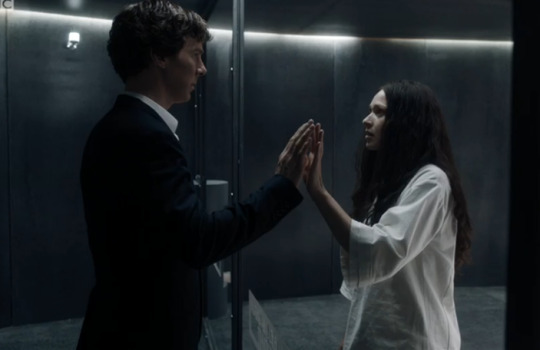
The whole “save John Watson” narrative is still going here. Whereas in TLD Sherlock needed on his death-bed to realise the value of his own life to John, (which is definitely not made clear in the slightest), here in TFP Sherlock is doing the same thing over again - saving John by saving himself.
Eurus symbolises the part of himself that was stolen from him as a child, when he began to figure out what he was, and then ‘what he was’ was immediately taken away from him. She represents the repression of his sexuality, which is why she was taken away and hidden and forgotten and locked in a cell (kept behind glass). Eurus is Sherlock’s fear of what he truly is and what he wants, she’s the “dangerous” in “love is a dangerous disadvantage”.
So he finds and saves Eurus, the two of them almost becoming the silhouette of one person as they hug in the dimly-lit attic room. Then up shoots John, de-chained and lifted from the well. Because Sherlock became ready for love when he “completed himself” by merging with his lost half, and then John was subsequently saved by that love.
Completing Sherlock as a human being has made him ready for romantic entanglement. He is now equipped to understand how good High Wycombe can be. So.....I guess that comes next? Steven? Mark? ¯\_(ツ)_/¯
Mary is Caught
Mary is the triple poisoner Sherlock caught in High Wycombe. He ‘caught’ her there, because the very act of Sherlock replacing Mary as John’s love interest, exposes her as the fake that she is. Making johnlock canon exposes heteronormativity as the villain in Doyle’s canon - the murderer who forced Doyle to decide to kill his creation.
@monikakrasnorada @ebaeschnbliah @gosherlocked @devoursjohnlock @the-7-percent-solution @possiblyimbiassed @sagestreet @shylockgnomes @sarahthecoat
285 notes
·
View notes
Note
One big issue with tv shows is that unlike with books, the message is incomplete. So they might temporarily put out the opposite message of what they will be saying in the end. Or not. Which is the issue. We don't know. What does your tv Utopia look like in regards to this issue? How do we combine accountability with artistic integrity and freedom? What framing should there be? What would it look like for Once Upon a Time?
Oo-kay. Forstarters, there’s a world of difference between message being incomplete (whichcan indicate less than adequate narrative development, to put it mildly) or if itis left to interpretation (which can vary between being clever, thoughtprovoking–even subversive) so I guess we can approach appraisal of OUaTfrom radically different angles–depending on our individual assessment of that starting point? So, I assume youalready know ours. It just cannot not start from the need to rationalizetheir ‘origins’ into the continuity, and it being–the accolades (or criticism,depending who you ask) they got for Lost. Because as we know, they have been praisedfor it–for all those explorations of that notion of multiplicity(alternative timeline/versions, etc) so we must take into account thepossibility of that affecting theirarrogance to start with–and that we have (possibly? probably? maybe?) giventhem undeserved ‘headstart’ so they took themselves too seriously–and approachedtheir new project (and their attitude/response to audience feedback, or lack thereof) in suchway? Also, more importantly–that they have naturally attracted the ‘intelligent’ followingfor it to begin with (because participatory culture surpasses basic passiveconsumerism, offers enriched dynamic, more lifelike experience–all thatjazz) thus ‘burdening’ themselves with a significantly more demanding audience, andit–affecting a more resounding feeling of our general discontent now?
Eitherway, that could explain the game of one-upmanship, of them striving to (andaround S3 starting to fail miserably, IMO) to stay two steps ahead of the audience.Hence the tactics of opposite message of what they will probably be saying in the end that you mention–so yes of course, false clues, red herrings, logicalfallacies or any other devices that lead audiences towards misleadingconclusions. Because it’s really hard to know anything in the middle? Andwhich now reminds me, I remember reading when someone was talking about Lost (perhapsJenkins, I think I also talked about it here, or somewhere–but just can’t go around diggingfor references, the archives became overwhelming, so–I just might repeatmyself, for which I apologise in advance :) and them trying to account for the things they invented in earlierseasons without too much thought of what they actually might mean and/or wherethey might lead (which sounds WAY too familiar now?) Dickens was mentioned. As in, how his works are nowseen as really well-structured novels because we read them in a bounded form,but in fact–he sometimes radically rewrote his ‘vision’ (which, retconning?) ofthe characters. So if the middle point is supposedly the most ‘productive’ space(because universally, fans also generate alternative versions of the narrativeas they theorize about what’s going on, versions which are very generative,very rich and interesting–like say, what you have been doing?) and while theyare exploring all the alternatives (which alas, usually manifest as randomness/retconningin their writing, these days?) shouldn’t it be, well–the most productive part?Instead of this… disastrous mash of pacing/contrivance, riddled with alarminglyhorrible messages–basically a pile of stinking heterosexist, racist, misogynistand homophobic shite? And all after that beginning that was so staggeringlypromising–and/or dangerously misleading?
Which brings me to, yes, fundamentally–the media industry (broadly defined) and the TV entertainmentindustry in particular, need to be far more accountable when it comes to themessage they create, both in the content itself, and the ways in which it is distributed.But if we try to combine accountability and artistic integrity and freedom–wecannot but question what IS Brothers Dim’s primary drive here? Free expression,pursuit of a vision, consistent and brilliant narrative (the ‘modern’re-envisioning of fairytales, subverting the old dogmatic tropes and all that)or are they driven purely by commerce, designed to build a brand that will multiplyrevenue streams or drive eyes toward a central moneymaking mothership? Because that’s the crux of the problem here.
And sinceyou asked, yes–my personal TV Utopia is of course all about the former. I do believe infree expression and I do believe that the showrunners have the right to createwhatever content they want–no creative limits or boundaries whatsoever. Hell,at one point I did believe that theory, that they were actually giving us twoparallel narratives, an obvious/direct one for the casual/superficialviewership (showing the cautionary tale of what’s not supposed to bea well-accepted normative) and the ‘hidden’ and yet obvious multi-layered onethat challenged the hegemony–and developed that ‘subversive’modern fairtytale about two mothers sharing a son, sense of understanding, acceptanceand ultimately, love. But as a rule, the issue becomes problematic when the show is aired–how it’s distributed and to which audiences. Because while the industry shouldbe far more vigilant, oftentimes they aren’t–because they go for pandering, asit is what (they think) sells. So inevitably the question arises,where does the ‘vision’ start being altered, twisted and is eventuallycompletely forgone–in favour of a product served/tailored by market target (whose age was drastically reduced in S4 with Frozen, in this case)audience? Inthe end leaving it to us, the more demanding crowds–tobelieve that we’ve either been misled (they tried, tested, enticed, and well–queerbaiting’s all we got left with?) or it was where they wereheading, but–they got yanked back by the PTB? And now basically giving way tothe biggest disagreement we might have here now: have we given WAY too much depthand meaning to this product than it really deserves (or was originally meant tohave, anyway) and thus credit to its authors, or are they (or well, were they–before PTBs trimmed theirwings) really intrepid and brave show runners with a brilliant vision?
You can guess what we here believe. Because sixyears later, the result is schizophrenic to say the least. For instance,sure–Hood might be a ‘prop’ for Regina but it looks like they keep hiring the idiot back (andthe story goes on and on and on?) and sure, Hook might just be a commentary oneverything that is screwed up about fairytale sexist dogma… but again, they’redragging it all way past the point of logic, no? So as a result we have here now is anintense, even toxic part of the audience (online fandom) while a whole other partof it is just as immersed in the story–but the story they think is being toldis far less subversive and actually far more dangerous. And the real problem has been the marketing of that kindof story–the story that tells you that Hook is your dream lad, 50 Shades of Rapecultureis the best romance ever written, and lesbians are mean and angry people whoshould just go away. Because bottom line: to go there by sacrificing your twostrongest female characters when the context you’re writing stories within–neithernecessitates nor justifies the undermining (or defiling) of these ‘strong women’, and… well. Onetruth is being told at the expense of the other?
Sooo… purelytextual analysis whilst ignoring all other factors including basic marketing issuesjust isn’t how television works. Because them writing all the negative and harmfulthings is something they SHOULDas showrunners be accounted for, and on a much larger scale. And they should, you know, either justify it or face the consequences far more seriousthan just dwindling ratings of the product they’re now having difficulties tosell. While in the meantime, the ‘mixed’ result of their struggle to balance and pander (they know it can’t be about just Hook, but nothing they wrote about him made people as disgusted as Regina’s stomach-churning shagging scene did–which was a crime against those of us who wantedto see that shirt unbuttoned for any bloody reason–what we can’t stop reiterating) leaves the ultimatequestion, not related to ships/shipping/endgames but rather aboutcharacter journeys–if we as large chunk of theaudience cannot ‘enjoy the ride’ (some of the stuff they wrote was/isdecidedly vile, even more than their collective treatment of an incrediblypersistent/masochistic fanbase that still have hope for Reginaand Emma, who despite what’s been shoved down our throats–stillare the core of this show) then someone please tell me…
What ISthe point? Because I seem to be… missing it.
#anothershadeofgreen#swan queen#ouat#regina mills#emma swan#deserve better#we as an audience#deserved better#but tell that to the two idiots#replies
19 notes
·
View notes
Text

Yall are doing such a good job socialising like normal people. totally.
#sims 4#the sims 4#ts4#s4: Utopia Project#s4up: Adrian Smith#s4up: Glenn Thorne#s4up: Bahar Kurosh#s4up: Jacob Lee#s4up: Liliana Graves
8 notes
·
View notes
Text
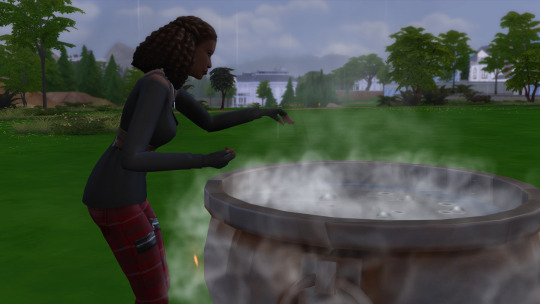
Now that she has a space of her own-ish, Liliana feels a little more safe experimenting with her magic without being discovered. Giant backyard cauldron get! If anyone asks, it's for laundry. Which they do also have, because diapers. It just felt right ya know?
7 notes
·
View notes
Text
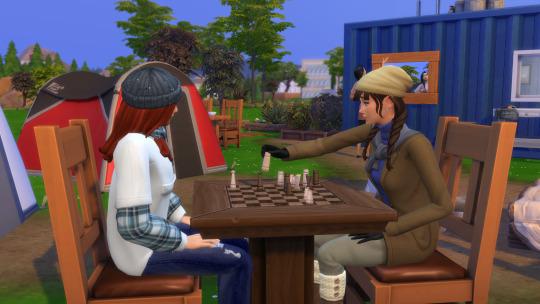
7 notes
·
View notes
Text
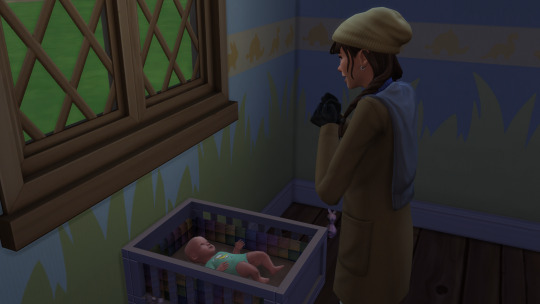
Speaking of: Willow went over to visit said baby. Meet Apollo Graves-Lee, named after Jacob's kid from that time he became an actor.
7 notes
·
View notes
Text

When Glenn isn't attempting to burn down the one structure we have, he has been hard at work making plenty of planter boxes to get his handiness skill up. Willow and Liliana have been making good use of them to expand the garden.
7 notes
·
View notes
Text
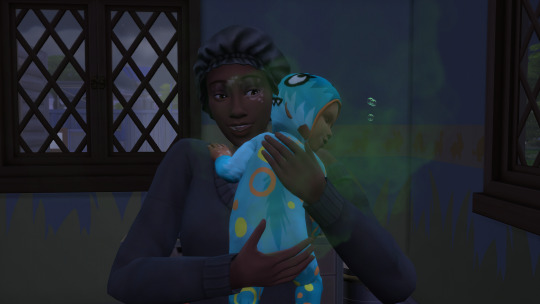
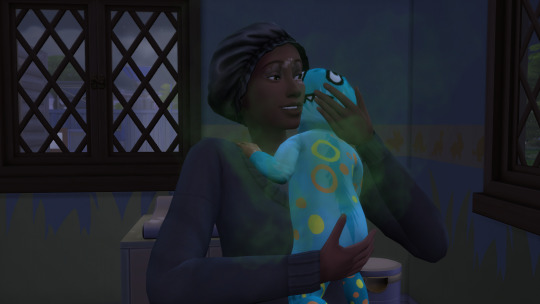
Lil stinker
6 notes
·
View notes
Text
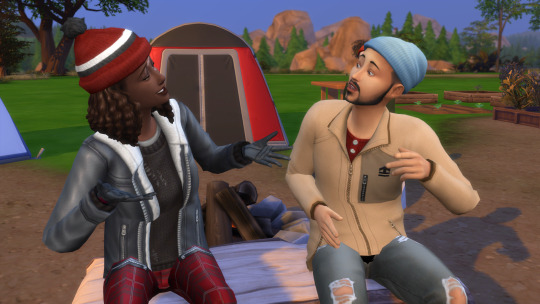
Jacob seems chill with having a kid in a field, so that's nice.
5 notes
·
View notes
Text
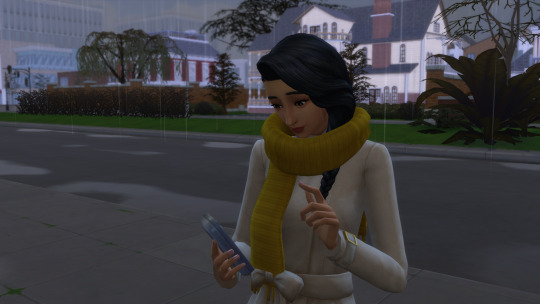
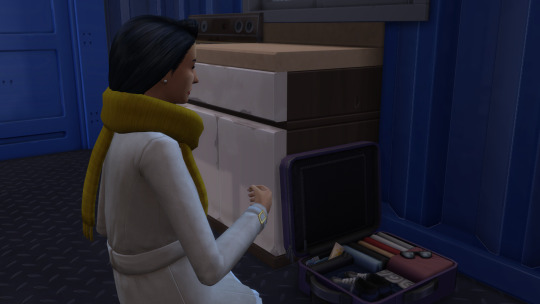
Bahar, as the official founder, got a day on her own, as well as me IMMEDIATELY breaking the rules and getting her the founder spot job in the politics career. It just felt right okay?
5 notes
·
View notes
Text
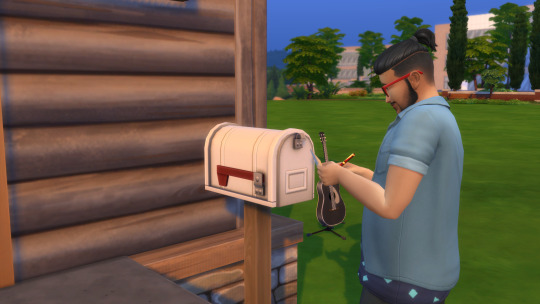
Licensing his first Guitar song, hoping to maybe have enough money for lights next round.
2 notes
·
View notes
Text
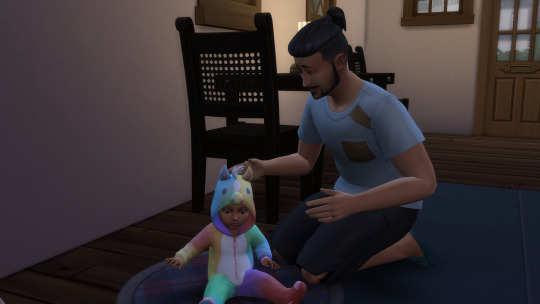
3 notes
·
View notes